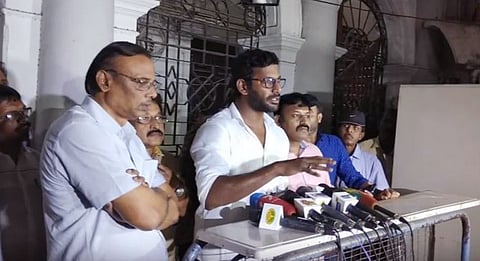
- Reviews
- Power List 2024
- Cannes 2024
- In-Depth Stories
- Web Stories
- News
- FC Lists
- Interviews
- Features
- FC SpecialsFC Specials

An eight-hour-long meeting involving the Tamil industry stakeholders (TFPC members, important exhibitors, digital service providers) and government officials on April 17 culminated in good news for the Kollywood industry. TFPC president Vishal briefly addressed the media after this marathon meeting, saying all the ticketing systems of theaters in the state would be completely computerised by June 1, bringing about transparency in box-office collections. He also spoke about flexible ticket pricing based on each film's level and developing an in-house ticketing portal with minimal online booking charges. Vishal said Qube had agreed to slash the Virtual Print Fees (VPF) for E-Cinema from Rs 9,000 to Rs 5,000 and from Rs 22,000 to Rs 10,000 for a film's full run, for a period of six months. A council meeting involving all the producers will be held today, April 18, to decide when film shoots and releases are to be resumed.
Prominent industry stakeholders spoke about the strike's resolution and what the road ahead is like:
P.Madan, producer, Escape Artists Motion Pictures
"What Vishal said was all good. Providing mastering facilities at the council will be helpful for all producers. We have to see the rate at which the council offers this service. Computerisation of ticketing systems will surely be implemented smoothly. The TFPC's in-house ticketing portal is a good idea. But that isn't the main issue for producers.
Today's meeting will give us more clarity about the D-Cinema discount and E-Cinema terms after six months. These Qube-related issues are very important. We also need to be briefed more about our resolution to not give films to syndicates who control a lot of theaters in each area. They don't give us favourable terms. I'm also waiting to hear more about the new DSPs who have signed up, their pricing and terms. Only after today evening's meeting will we know whether the strike was completely successful."
Senthil Kumar, co-founder of Qube Cinema
"We were driven to act and reduce our rates even further. Theater owners were getting desperate with the lack of content. We budged! During the strike, we were still operating in other states and the financial burden wasn't huge. Overall, the industry was desperate and we also had a moral duty as more than 2 lakh workers were without a job for the past two months.
We will have more clarity on the financial implications of our new rates after two to three months. We can't make immediate predictions. Thanks to the reduced VPF rates, more small films will release and our losses will be recouped to an extent. Since it's a really big rate reduction this time, we have to wait and see what happens. We have agreed in principle to genuinely give it a try for six months, keeping in mind the industry's best interests.
Regarding D-Cinema, all five Southern states will follow the rates that the Joint Action Committee (JAC) decided in Hyderabad. There will be a firm commitment to what the JAC decided. We'll take stock of the situation again in December. In TN, the penetration of E-Cinema is slightly more than D-Cinema, with a 60-40 ratio. The smaller films will majorly benefit with our E-Cinema VPF reduction.
Flexible ticket pricing is always good and computerisation of all theaters is a good idea too. The theatres were already willing to go for complete computerisation. But, I'm not too convinced by their idea of an in-house ticketing portal. It's a year-long job at least and can't be done in a crude way; it has to be scalable. The operating cost will be huge! Without promotional schemes and strong incentives, the audience won't opt for a new ticketing portal just like that."
Ruban Mathivanan, GK Cinemas, Chennai
"Everyone got tired of this strike; we were all desperate for a resolution. The VPF equation is purely between the producers and the DSPs. We won't be involved.
Our theater's ticketing was already computerised. In fact, 70% of TN theaters are computerised and the rest were also to follow suit by May-end. We had also requested the council to not give films to theaters that aren't computerised. How soon and how efficiently the council will go about setting up a ticketing portal has to be seen. All theaters have a business agreement with ticketing sites. Until that agreement ends, theaters can't opt for this new portal.
I see online ticketing as a luxury, not a necessity. 70% of our weekend tickets are sold online; we charge Rs 25 extra per ticket. Outside Chennai and Chengalpet, online bookings aren't that strong. Only about 10% of all the TN theaters have major online bookings. I don't know why the council is insisting on this. And, despite their infrastructure, the servers of even big portals like ticketnew and BMS crash during the bookings of star films. Even spicinemas had to supplement their ticket bookings through sites like BMS and PayTM to handle the load. The council's new portal will be a challenging task.
Flexible ticket pricing will be possible only if the government passes a GO (order) and fixes slabs. Ultimately, the content should be good. Recently, for Aruvi and Thaana Serndha Koottam, we maintained the same ticket rates. There were no adverse effects. Flexible pricing is not an essential survival measure for the industry, but will benefit the smaller films. Like in some of the other metro cities, we can consider different rates for the weekdays and also variable rates for each show slot within a day."